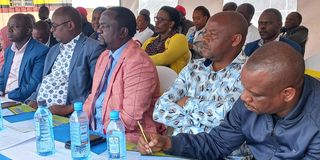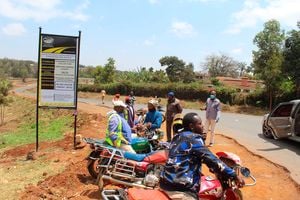Public participation: Costly cosmetic exercise?

Athi leaders led by Mavoko MP-elect Patrick Makau (centre front row) during the East Africa Portland Cement land regularisation public participation forum in Athi River on August 26, 2022.
What you need to know:
- Kenyans give their views and suggestions whenever a proposed programme or project is in the pipeline.
- But are their views taken into consideration or treated as mere suggestions?
Public participation is the cornerstone of the 2010 Constitution.
However, it has become a bone of contention in various state initiatives and laws and regulations passed in Parliament since 2013.
Kenyans give their views and suggestions whenever a proposed programme or project is in the pipeline.
But are their views taken into consideration or treated as mere suggestions?
So contentious is the matter that on April 17, 2014, then High Court Judge George Odunga, now Court of Appeal Justice, ruled on the importance of public participation in government decisions, specifically in the lawmaking process.
Justice Odunga noted that public participation plays a central role in legislative and policy functions of the government, whether at the national or county level and not just a "cosmetic" exercise.
“It applies to the processes of legislative enactment, financial management and planning and performance management,” ruled Justice Odunga.
Read: How to achieve effective public participation
The precedent-setting ruling was on whether the Finance Act of 2013 of Kiambu County had undergone the requisite public participation before its enactment.
The judge noted: “Having considered the foregoing, the inescapable conclusion I come to is that there was no public participation as contemplated under the constitution and the County Government Act of 2012.”
Taking in cue, so many subsidiary laws and decisions made by the executive have found their way into court, with the petitioners challenging them based on public participation.
Article 118 of the Constitution, on public access and participation, states: “Parliament shall openly conduct its business, and its sittings and those of its committees shall be in public, and facilitate public participation and involvement in the legislative and other business of Parliament and its committees.

Members of the public give their views to the Prof David Some-led Presidential Working Party on Education Reform chairman in Eldoret on November 11, 2022.
It also adds: “Parliament may not exclude the public, or any media, from any sitting unless in exceptional circumstances the relevant Speaker has determined that there are justifiable reasons for the exclusion.”
Sadly, MPs are yet to pass a subsidiary law on the matter, with the fate of the 2023 Public Participation Bill in limbo.
The Bill, sponsored by Parliamentary Broadcasting and Library Committee chair, seeks to provide a framework for effective public participation to give effect to the constitutional principles of democracy and participation of the people under Articles 10(2), 118, 196, 201(1) and 232 (1)(b) of the Constitution and for connected purposes, still in abeyance.
The lack of a clearly defined legal framework has left Kenyans grappling with unpopular decisions like the Affordable Housing levy imposed by the government, despite the majority of the Memorandum of Understanding (MoU) presented before the MPs opposing the same.
Read: Call to change law on public participation
The Affordable Housing Bill 2023, now an Act of Parliament following its assent by the president on Tuesday, might also face another legal battle despite undergoing public participation as provided for by the Constitution and decreed by Justice Odunga, as per the public view documented.
A look at the joint report of the committees of the National Assembly - Finance and National Planning and Housing, Urban Planning and Public Works - raises fears that the public participation undertaken on the Bill may not have served its purpose.
Although Kenyans opposed the imposition of the 1.5 per cent housing levy, arguing that it was burdensome and was not reduced or removed from the Bill that became law.
According to Justice Odunga, the phrase to “facilitate public involvement” is a broad concept “which relates to the duty to ensure public participation in the law-making process.”
“The key words in this phrase are “facilitate” and “involvement”,” the judgment reads. To “facilitate”, the Judge said, means to “make easy or easier”, “promote” or “help forward”.
Therefore, the phrase “public involvement” is commonly used to describe the process of allowing the public to participate in the decision-making process.
“The dictionary definition of "involve" includes "to bring a person into a matter” while participation is defined as “taking part with others, in an action or matter.....the active involvement of members of a community or organisation in decisions which affect them.”
Parliament has yet to enact the Public Participation law to properly define it, meaning that the views raised by Kenyans whenever they appear before government authorities on a public affair issue remain a formality.
Read: More need to be done on public participation
For instance, the residents of Homabay County pushed to have clause 4 (2) (b) of the Affordable Housing Bill 2023 amended to specify the mechanism for collecting contributions from informal income earners.
The residents emphasised the need for individuals earning informal income to be in the levy system outlined in the Bill.
“By amending the clause to include clear guidelines and procedures for collecting contributions from informal income earners, the stakeholders believe that the housing programme can more effectively reach and benefit a broader segment of the population including those in the informal sector,” the residents’ submission to the committee read.
Although the committee noted the proposal by the stakeholders and recommended that the clause amended to provide the provision of the Tax Procedures Act shall apply, how the government will collect levies from those in informal employment remains unaddressed.
Mr Joshua Nyamori, an advocate of the High Court, pushed for harmonisation of provisions as contained in the current Housing Act and the Bill.
He noted that the existing National Housing Corporation (NHC) board is sufficient, and there is no necessity for a separate Affordable Housing Board.
Read: Public participation forums have to be attractive, inclusive
However, the joint committee said as currently drafted, the objective of NHC is to provide loans and grants of public money for the construction of dwellings.
The committee noted in its report that the objective of the Bill is to provide a legal framework and a funding mode for provision of affordable housing to Kenyans.
“Therefore, the Act and the Bill complement each other through a structured way of giving effect to the constitution, which provides in Article 43 (1) (b) that every person has a right to access adequate housing and reasonable standards of sanitation,” reads part of the committee's recommendations.
Mr Nyamori also questioned the rationale behind other entities administering the fund when it is essentially a tax deduction from citizens.
He proposed that NHC and its independent board could effectively oversee the Affordable Housing Board and the fund without additional entities, ensuring transparency and accountability.
The committee ignored this. Article 201 of the Constitution provides that openness and accountability, including public participation in financial matters, shall guide all aspects of public finance “in the Republic.”
An advocate practising in Nakuru, who appeared before the committee, raised concerns that the Bill does not adhere to the doctrine of separation of powers “as it appears to be encroaching on the functions of the county governments.”
But the committee defended the Bill, saying it makes provisions for the Council of Governors (CoG) to appoint a member to the board.
The advocate also noted imposing a 1.5 per cent levy is overly burdensome for taxpayers, suggesting that private developers be engaged to provide affordable housing without imposing additional financial obligations on citizens.
He also emphasised the importance of implementing safeguards to ensure that public lands allocated to private partners are used exclusively for the intended purpose of the housing project, “aiming to prevent any misuse or diversion of resources.
The committee did not express its opinion on these concerns, as the levy remained at 1.5 per cent in the Bill that became law.
The representatives of persons with disabilities in Narok raised concerns about the parcels of land designated for unit construction, seeking clarification on the ownership status of the land earmarked for “these purposes.”
The committee noted that the current land legislation is sufficient to address the concerns of the stakeholders, and provisions need not be in the Bill.
The Vice Chancellor of Kaimosi University sought to have clause seven of the Bill amended to increase fund allocation to institutional housing to cover more student accommodation.
The clause sought to enhance the allocation of funds towards institutional housing for students.
The committee, however, resolved to allow the board to allocate resources on a demand basis, which may also include institutional houses.
The Vice-Chancellor wanted the 90 days on voluntary savings refund reduced to 60 days, arguing that this would expedite the process of returning savings to contributors who opt to withdraw their funds voluntarily.
While the committee noted the concerns and even agreed to reduce the waiting days from 90 to 60, the Bill, passed in parliament and assented into law, did not reflect the recommendations.
The Kenya National Chamber of Commerce recommended amendment of clauses 4 (2) of the Bill, deeming them unnecessary towards salaried employees.
The chamber of commerce argued that Micro, Small and Medium Enterprises (MSMEs) also generate income, and the tax burden should be more equitable.
However, the committee disagreed, noting that it is not discriminatory as it imposes the payment of the levy to both salaried and non-salaried persons.
However, MPs failed to address how the government will tax those in informal employment to ensure that everyone who earns an income, whether in formal or informal employment, pays the levy.
The Ministry of Education pointed out that social amenities integrated into the projects should encompass schools to cater for the children within the housing project community.
Further, they emphasised that the project should also offer decent accommodation for teachers.
While noting the concerns, the joint committee resolved to allow the Affordable Housing Board to allocate resources on a demand basis, which may also include institutional houses.
The Finance Law 2023 received the highest number of MoUs since the enactment of the 2010 constitution.
[email protected]





